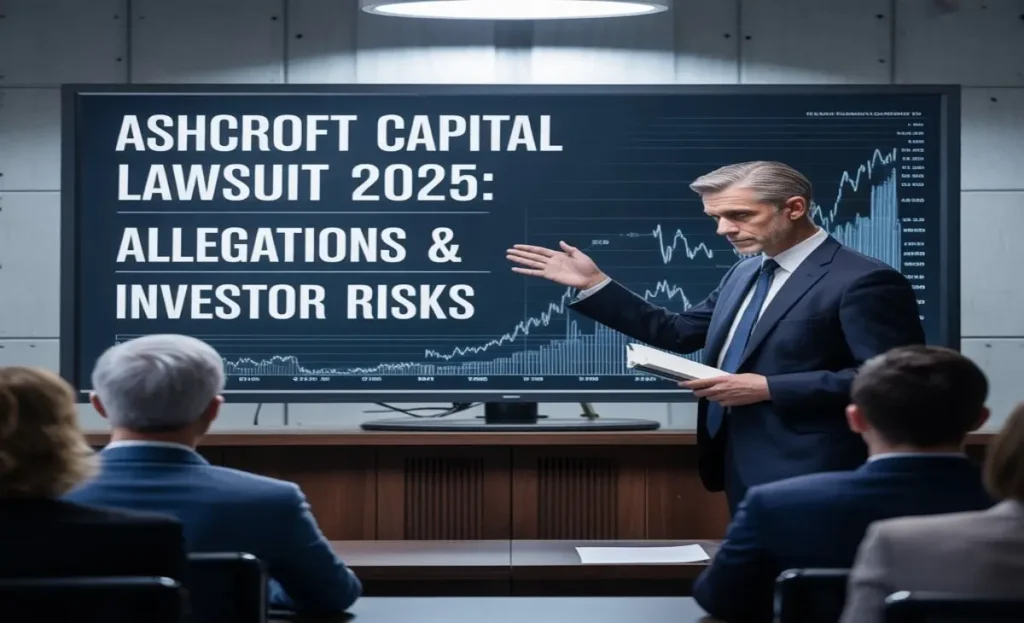When someone searches for the ashcroft capital lawsuit, they’re often seeking clarity, reassurance, or actionable insights. This topic matters because it touches on investor protection, firm accountability, and the broader integrity of real estate syndication. Whether you’re an investor, adviser, or simply inquisitive, exploring this lawsuit can empower you to make informed decisions and understand evolving industry standards.
Definition and Core Allegations
At its core, the ashcroft capital lawsuit refers to a legal case initiated by investors in early 2025, claiming that Ashcroft Capital misled them through overly optimistic projections, insufficient disclosures, and conflicts of interest—actions that may constitute securities fraud, breach of fiduciary duty, and fraud-related violations.
Regulatory and Compliance Considerations
The lawsuit directly implicates regulatory frameworks surrounding syndication and securities. Key concerns include whether Ashcroft followed SEC Regulation D exemptions, adhered to proper risk disclosures, and honored their fiduciary obligations to limited partners. In light of scrutiny, some real estate firms are enhancing compliance functions, governance structures, documentation processes, and investor communications to avoid similar problems.
Explore more insights on our homepage for the latest updates.
Evolution of Legal Proceedings
As of mid-2025, the ashcroft capital lawsuit is deep in the discovery phase. Investors have demanded internal records—IRR forecasts, marketing materials, financials, and fee schedules—while Ashcroft has sought extensions to produce them fully. A former employee’s affidavit claiming internal pressure to overstate deal profitability has emerged as a potentially pivotal piece of evidence Ashcroft Capital Lawsuit. Settlement discussions may be underway, with a mediation session scheduled for September 2025 and trial possible in early 2026 Ashcroft Capital Lawsuit.
Impacts on Investors
Investors tied up in Ashcroft syndications are grappling with halted distributions, surprise capital calls, and financial losses. The unfolding legal battle has eroded trust, disrupted passive income streams, and amplified concerns about liquidity and governance. For many, this lawsuit marks a wake-up call to monitor investments more actively, consult legal advisers, and scrutinize marketing materials rigorously.
Implications for Future Real Estate Investments
This lawsuit has broader implications across the syndication industry. Investors now expect greater transparency, third-party audits, and stronger disclosures. Syndicators are rethinking financial models, risk presentations, and communication protocols. Regulators may increase oversight, and prospective participants in multifamily syndication are practicing heightened diligence before investing media.
Investor Risk Mitigation Strategies
One of the most practical uses of the ashcroft capital lawsuit is learning how to protect your investments going forward. Before participating in new syndications, consider strategies such as: demanding base, stretch, and stress case projections; requesting independent market validation; negotiating clarity around waterfall structures and performance hurdles; insisting on regular, detailed KPI dashboards; and retaining legal or accounting professionals to vet documents. These steps can significantly reduce vulnerability to misrepresentation or poor governance Management Works Media.
Company Response and Internal Reforms
In response to investor claims, Ashcroft Capital has publicly denied wrongdoing, stating that all returns were clearly marked as estimates and risks were disclosed. The firm has initiated internal audits, upgraded investor reporting, and implemented compliance process enhancements to rebuild trust. These internal reforms—if genuine—could serve as a benchmark for how real estate sponsors should address investor concerns.
New Section: Broader Industry Learnings
The ashcroft capital lawsuit serves as more than an investor dispute—it’s a cautionary tale. Across the real estate investment ecosystem, stakeholders are re-evaluating underwriting assumptions, fee transparency, and sponsor incentives. Investors are forming oversight groups, demanding third-party inspections, and questioning syndicators more closely before committing capital Techy Flavors. This growing skepticism could lead to higher standards and a healthier investment environment over time.
FAQs
What is the Ashcroft Capital lawsuit about?
It’s a legal case begun by investors in 2025, claiming misrepresented returns, withheld risks, and misuse of capital—all potentially constituting securities fraud or breach of fiduciary duty.
How far has the case progressed?
As of mid-2025, discovery is underway with internal documents slotted for release. A former analyst’s affidavit is fueling momentum. Mediation is scheduled for September 2025, with trial possibly in early 2026.
What are typical investor risks in this context?
Frozen distributions, surprise capital calls, loss of confidence, and delayed or diminished returns are common risks highlighted by this case.
How can I protect myself from similar issues?
Vet disclosures carefully, demand independent validations, secure clear legal agreements, track KPIs regularly, and consult experts before investing.
Has Ashcroft Capital made changes?
Yes. The firm denies intent to mislead, and has rolled out internal audits, better investor reports, and strengthened compliance and governance practices.
Will this case influence the industry?
Absolutely. It’s prompting more cautious investor behavior, stricter sponsorship protocols, and possibly more regulatory scrutiny across syndication space.
Conclusion
The ashcroft capital lawsuit is more than a lawsuit—it’s a clarion call for accountability, transparency, and investor empowerment in real estate syndication. While litigation unfolds, remember that due diligence, professional guidance, and clear documentation are your strongest allies. If you’re involved—or planning to be—stay informed, speak to knowledgeable counsel, and prioritize transparency and trust. Your financial future depends on it.





